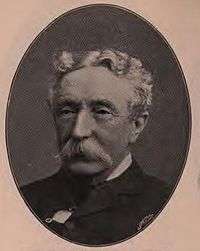John James Mellor
Colonel John James Mellor (12 August 1830 – 12 January 1916) was a British industrialist and Conservative politician.

Early life
Mellor was born in Oldham, Lancashire, and was educated privately.[1]
Business and military
He entered business as a cotton manufacturer and became chairman of J & J J Mellor Limited of Bury and Brook Mills Limited of Heywood.[2] He was also involved in railway administration, and was a director of the Metropolitan Railway and the South Eastern Railway.[1][2]
For twenty-seven years he held a commission in the Volunteer Force, retiring as honorary colonel of the 1st Volunteer Battalion of the Lancashire Fusiliers.[3]
Politics
In 1892 he stood as Conservative candidate for the Radcliffe cum Farnworth constituency, but failed to be elected.[1] Robert Leake, the sitting Liberal MP stood down at the next general election in 1895. Mellor was again selected as Conservative candidate, and was elected as member of parliament, benefitting from both a large swing to the Conservatives and the fact that Leake had a large personal vote.
Mellor was only in the Commons for five years, deciding not to stand again.[4] At the 1900 general election Radcliffe cum Farnworth was regained by the Liberals.
Apart from his business and political activities, Mellor took an interest in science and engineering, and was a fellow of the Royal Astronomical Society for nearly sixty years.[2]
Family
He married Jennette Clegg in 1865, and they lived at The Woodland, Whitefield near Manchester.[3]
Their son Walter Clifford Mellor was an ordained minister[5] and leading member of the Neo-Jacobite Revival before the First World War.[6] He married Helen Stewart the daughter of Alan Stewart, 10th Earl of Galloway. She took the title Lady Helen Mellor, and joined Walter in the Legitimist Jacobite League of Great Britain and Ireland.[7]
References
Notes
- New Members of Parliament, The Times, 19 July 1895, p.15
- "Obituary notice, Fellow: Mellor, John James". Monthly Notices of the Royal Astronomical Society, Vol. 77, p.303. SAO/NASA Astrophysics Data System. 1917. Retrieved 1 October 2008.
- An Old Volunteer Colonel, The Times, 14 January 1916, p.5
- The General Election, The Times, 22 September 1900, p. 10
- Burke's Genealogical and Heraldic History of Peerage, Baronetage and Knightage. Burke's Peerage Limited. 1914.
- Pittock, Murray (1 August 2014). Spectrum of Decadence: The Literature of the 1890s. Routledge.
- Fletcher, Ian (1987). W.B. Yeats and his contemporaries. Harvester. p. 86. ISBN 978-0-7108-0613-0.
| Parliament of the United Kingdom | ||
|---|---|---|
| Preceded by Robert Leake |
Member of Parliament for Radcliffe cum Farnworth 1895–1900 |
Succeeded by Theodore Taylor |